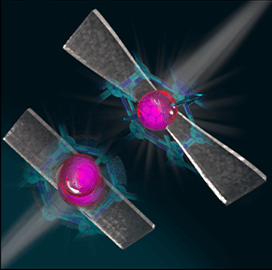
Quantum cubits study
Diamond Films May Make Quantum Networks More Feasible, Research Shows
Using diamonds dilated into thin films may make quantum networks more feasible, according to research by the U.S. Department of Energy’s Argonne National Laboratory, the University of Chicago and Cambridge University. Q-NEXT, an Argonne-led DOE National Quantum Information Science Research Center, partly supported the research.
In their quantum network engineering study, the researchers said they were able to create quantum bits out of stretched-thin diamond films, which were able to operate with significantly less equipment. The experimental shift to diamond quantum bits, which are more controllable, also turned out less costly, Argonne National Laboratory said.
Using the diamond qubits technique is “much less resource-intensive to operate” because the systems’ operating temperature can be dramatically increased with the approach, said Alex High, assistant professor at the University of Chicago’s Pritzker School of Molecular Engineering, whose lab led the research.
The researchers also reported that the diamond qubits are controllable with microwaves, eliminating the use of light in the quantum network’s optical wavelength that introduces noise and jeopardizes fidelity when entering information and operating the system. With the diamond qubits and microwave approach, the system’s reliability rose to 99 percent, they added.

Category: Federal Civilian




